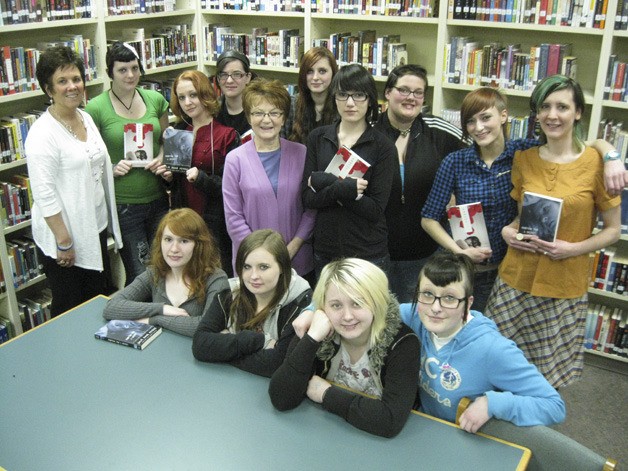It’s a book club, a close association unlike any other for growing teenagers.
At West Auburn High School, the club’s profound purpose bridges the pages of realistic, problem-identifying novels to everyday experiences for kids.
The books draw parallels, its compelling stories relating to the lives of teens with similar challenges. The books become an outlet to share thoughts, express ideas, extol successes and face fears.
Introduced to students at the school two years ago, the program is still growing strong today. The West Auburn Book Club continues to inspire young readers, connecting staff, students and authors in a thought-provoking way.
“We have a very tight-knit group here. Anything that we talk about stays within the group,” said Rachel McDonald, a teen librarian for the King County Library System and one of the primary leaders of the book club program. “We have figured out and fostered that trust, which is a fantastic thing.”
McDonald was at the forefront of a program in 2009, made feasible through a grant from the American Library Association. Auburn was one of more than 200 libraries nationwide to receive the grant to support a book-and-discussion series.
As a recipient of the ALA grant, West Auburn received programming resources as well as copies of the books for distribution to the club’s teen participants.
The year-round school program was created to provide at-risk teens with an opportunity to examine and explain theme-related books filled with characters struggling with similar issues.
“From there, we realized this is something the students really enjoyed, and the discussions were fantastic,” McDonald said.
So the library pursued, and earned, continued funding.
The club meets regularly at the school library to read, review, debate and resolve sensitive and controversial teen subject matter. The club tackles young adult novels on drug abuse, suicide, sexuality, gangs, discrimination and other social issues often shunned by society.
Such a club gives the teens a voice, a means to discuss issues that other groups would not approach.
“A lot of the books are very realistic and apply to some of the situations other students are going through,” said junior Ashton Aldrich. “And with the discussions we have about them … we try to put (the books) in perspective and how they apply to us.”
The group recently examined L.K. Madigan’s “Flash Burnout” – an edgy, realistic tale of life and death, love and loyalty.
Fifteen-year-old Blake meets a girl with a meth-addicted mother. Blake tries to find the right way to reach out to his girlfriend as she struggles to reach out to her mom.
The group freely tackles the storyline and the meanings between the lines.
“The books apply to what most of us are going through,” said Tony Carpenter, a junior. “A lot of us in here have known each other for a while. We’re really close. We’re not afraid to put out the things that we’ve been through that we wouldn’t usually tell other people. The discussions of all these books bring us all closer.”
The club also receives occasional author visits, including the latest by Julie Anne Peters.
The program has had a positive impact on kids, McDonald said, providing them with more insight and perspective on a wide range of topics.
“A lot of the time we don’t realize what other people are going through. They may be going through the same things we are, and we sort of keep it to ourselves,” said CeCe Grahn, a senior. “But with the book club, we get to discuss it, and luckily Rachel picks books that are really good for our age group and demographics.
“It really applies to us and helps us with our own lives.”


